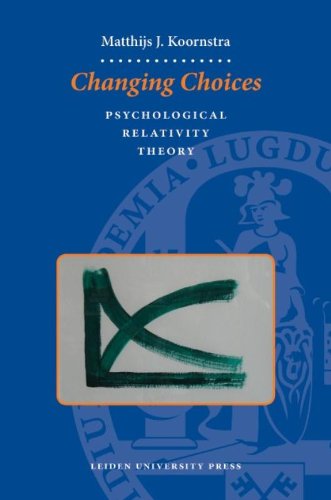
Changing Choices: Psychological Relativity Theory
by Matthijs J. Koornstra
Publisher: Leiden University Press 2007
ISBN/ASIN: 9087280181
ISBN-13: 9789087280185
Number of pages: 514
Description:
The book contains a unifying theory on how the common object space is metrically transformed by individuals with different transformation parameters, due to their other previous experiences, to individually different psychological spaces for judgment on the one hand and preference on the other hand. Individual experiences also change generally, whereby the psychological spaces also change generally for each individual.
Download or read it online for free here:
Download link
(7.4MB, PDF)
Similar books
 Freud and the Scientific Method
Freud and the Scientific Methodby Paul Rosenfels - Ninth St Center
Freud was a towering literary figure, a communicator who raised the consciousness of the civilized world in psychological matters. Now it is up to others to make something substantial out of the opportunity thus afforded by his pioneering zeal.
(16821 views)
 The Interpretation of Dreams
The Interpretation of Dreamsby Sigmund Freud - Macmillan
This book outlines Freud's theory of unconscious forces in the context of dream analysis. Introducing the id, the superego, and the ego, Freud advanced scientific understanding of the mind by exposing motivations invisible to our consciousness.
(22817 views)
 Introduction to Psychology
Introduction to Psychologyby Charles Stangor - Flat World Knowledge
I wrote this book to help students organize their thinking about psychology at a conceptual level. You will learn that psychology matters because it helps us understand behavior and that our knowledge of psychology is based on empirical study.
(17384 views)
 An Alternate Awareness
An Alternate Awarenessby Gregory H. Wlodarski - Smashwords
This book introduces the reader to brain structure and function and presents various studies involving brain scans to bolster the case that there is a neurological basis for the two types of awareness, ego-centered and egoless.
(6765 views)